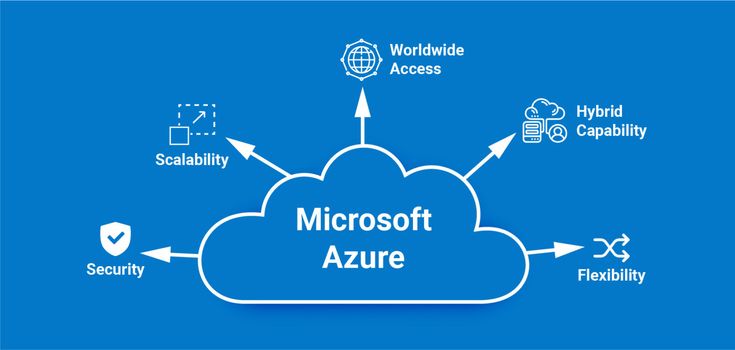Why Azure is Essential for Anyone Embracing Cloud Computing
 Eniola Ajala
Eniola Ajala
Why Cloud Computing?
As you know, the world is rapidly going digital, and everything is moving at a fast pace. In this article, I will introduce you to cloud computing and Microsoft Azure. We will explore how these two are interconnected and break down the key concepts. Make sure you read this to the end. Now, let’s get started with an example.
Let’s say you own a local coffee shop and decide to create a mobile app to increase customer loyalty. This app could allow customers to order ahead, earn rewards, and get updates on new menu items. At first, you expect only a handful of regulars to use it, so you might think a small server setup will be sufficient. But imagine your app suddenly becomes popular because a food influencer mentions it online. Now, hundreds, maybe even thousands of people start downloading it and placing orders.
With traditional server setups, you’d likely hit capacity quickly, leading to app slowdowns, crashes, and frustrated customers. Not to mention, the cost to expand your server capacity to keep up with demand would be massive and take time to implement.
The Catch: High Costs and Scaling Challenges
While owning your own servers sounds promising, there are two significant downsides. First, the initial setup is costly. Servers, storage, networking, and maintenance add up quickly, and for someone just starting out, that investment can be daunting. Second, it’s risky. If your website doesn’t attract as many users as expected, you won’t be able to recoup those costs. On the other hand, if your website does become famous and attracts high traffic, you’d need to buy even more servers to keep up with the demand, resulting in continuous and unpredictable expenses.
The Solution: Cloud Computing
This is where cloud computing comes in. The simple solution is Cloud Computing. Cloud computing allows your business to meet customer demand without risking high upfront costs.
What is Cloud Computing?
When people hear cloud computing, they might picture data floating somewhere in the sky. But in reality, the cloud is not a literal cloud ; it’s a network of physical servers housed in secure data centers across different locations.
Cloud computing is a platform that gives users access to a vast range of computing resources, like storage, servers, databases, and applications, without having to own or manage any physical hardware.

To understand this better, picture a massive data center with rows and rows of servers, all humming away in a secure building/facility. Cloud service providers like Microsoft Azure, Amazon Web Services (AWS), and Google Cloud manage these centers, offering users remote access to their resources.
They handle the infrastructure, security, and maintenance, so you can focus on what you want to do, whether that’s developing an app, analyzing data, or hosting a website.
So, the next time you hear about “the cloud”, remember: your data is not floating in the sky.
How Cloud Computing Works
It’s quite easy, think of it like subscribing to a streaming service like Netflix. You don’t own the movies or shows, but with a subscription, you can access any content you want when you need it. Similarly, with cloud computing, you pay for access to computing resources and can scale up or down based on your needs. I hope you got that!
Flexibility with Pay-As-You-Go
Cloud platforms allow you to scale up or down seamlessly, depending on demand. If your website suddenly goes viral, you can quickly increase your resources to handle the traffic without purchasing any new hardware. Conversely, if traffic dips, you can scale back and reduce costs, paying only for what you use.
Most cloud providers offer a flexible, pay-as-you-go model, which is revolutionary for businesses and individuals. Instead of buying expensive hardware and then hoping it meets your needs, you only pay for what you actually use.
What Can Cloud Computing Do?
Cloud computing makes it easy for you to have access to advanced technology. Here are some of the incredible things made possible through the cloud:
1. Machine Learning and Data Analysis
Cloud platforms provide access to powerful computing resources that make advanced data analysis and machine learning (ML) accessible to everyone. With cloud-based ML, you can analyze huge datasets to gain insights, make predictions, and make smarter decisions without the need for costly hardware or maintenance.
2. Data Storage and Backup
Cloud computing allows you to store, manage, and back up data effortlessly without needing hard drives or physical storage servers. Cloud platforms (e.g. Azure) keep your data safe and accessible, even if your physical device fails.
3. Streaming Media Content
Have you ever wondered how Netflix, Spotify, or YouTube can serve millions of users globally at any given moment? Cloud computing makes this possible! Media files are stored in the cloud, enabling high-quality streaming without lag or buffering, even during peak usage times.
4. Creating Software Applications
Software development is faster and more collaborative, thanks to the cloud. Developers can work on applications in real-time from anywhere in the world, sharing code and updates without stress.
5. Automation
Automation has become a must-have for businesses looking to streamline operations, and the cloud offers robust tools to support it. Cloud-based automation tools save time and improve efficiency.
6. Hosting Blogs and Applications
You don’t need to own or manage any physical infrastructure. Instead, cloud services provide everything you need to launch and scale your online presence. Cloud hosting is secure, flexible, and cost-effective.
What is Azure?
Now, lets talk about Azure! Azure is Microsoft’s premier cloud computing platform, designed to empower businesses and individuals with a vast array of resources and services.
From the example above, using Azure, you can create an app infrastructure that adjusts based on demand. If your app starts gaining popularity, Azure’s cloud services automatically scale up to handle the new traffic without a hitch. When the excitement settles down, your app’s resources scale down to save costs, so you’re only paying for what you need when you need it.
Azure’s scalability means you can start small but have the ability to handle a big demand spike if your app takes off. Another amazing thing is, it has built-in security, data backups, and analytics, you can be rest assured your customer data is secure and you can analyze user behavior to improve their experience.

Microsoft Azure offers a comprehensive suite of over 200 services across 18 categories (how awesome!), making it one of the most versatile cloud platforms available today.
A Brief History of Azure
Azure launched on February 1, 2010, Azure began its journey as a robust platform for building and hosting applications in the cloud. Initially branded as Windows Azure, it was reimagined as Microsoft Azure in 2014 to better reflect its evolution beyond just Windows-based services. Over the years, Azure has expanded significantly, adapting to the growing demands of developers and businesses.
Key Services of Azure
Let’s explore some of the key services offered by Azure in different categories.
1. Compute Services
- Virtual Machines (VMs): Azure VMs allow you to create and manage virtual servers, which can run Windows or Linux operating systems.
- Cloud Services: Azure’s cloud services facilitate the creation of scalable applications. These services provide a platform to host web applications, services, and APIs without worrying about the underlying infrastructure.
- Azure Service Fabric: This microservices platform allows you to build, deploy, and manage scalable and reliable applications. Service Fabric makes it easier to develop complex applications with multiple microservices, ensuring high availability and resilience.
- Azure Functions: With Azure Functions, you can easily build serverless applications in any programming language of your choice, such as C#, Python, or JavaScript. This means you only write the code for your specific task or function, and Azure handles the rest.
2. Networking Services
Azure’s Networking Services provide essential capabilities to enhance connectivity and performance.
- Azure CDN (Content Delivery Network): Azure CDN helps deliver web content, such as images, videos, and scripts, with high bandwidth and low latency to users all around the world.
- ExpressRoute: This service allows you to create private connections between your on-premises infrastructure and Azure. ExpressRoute offers more reliability, faster speeds, and lower latencies than typical internet connections.
- Virtual Network: Azure Virtual Network (VNet): Provides a secure and isolated environment for your Azure resources to communicate. You can define your own IP address space, create subnets, and establish secure connections to your on-premises network.
- Azure DNS: This hosting service allows you to manage your domain names with Azure. It provides ultra-low latency and high availability, ensuring that users can access your applications without delay.
3. Storage Services
Azure’s Storage Services are designed to handle various types of data efficiently and securely.
- Disk Storage: Azure Disk Storage provides persistent storage for your virtual machines. You can choose between Standard and Premium SSDs, ensuring you get the performance you need for your applications, whether they require high throughput or low latency.
- Blob Storage: Azure Blob Storage is optimized for storing unstructured data, such as images, videos, and backups. With features like tiered storage and lifecycle management, you can efficiently manage your data and save costs by moving less frequently accessed data to lower-cost tiers.
- File Storage: Azure File Storage offers fully managed file shares in the cloud that can be accessed via the SMB (Server Message Block) protocol. This service allows you to easily share files between applications and users.
- Queue Storage: Azure Queue Storage is a service for storing large numbers of messages in the cloud. It enables asynchronous communication between application components, ensuring that your applications can handle peak loads and process requests efficiently.
Why Choose Azure?
Azure, Microsoft’s cloud platform, offers an easy, scalable, and cost-effective solution. With its extensive suite of tools and services, Azure allows individuals and businesses to launch websites, store data, and run applications without upfront infrastructure investments. It’s a flexible, pay-as-you-go model, making it an ideal choice for anyone looking to take their ideas online. Plus, Azure’s global network ensures that your website can be accessed swiftly from anywhere in the world, providing an optimal experience for users.
What can you use Azure for?
Azure, Microsoft’s cloud platform, offers an easy, scalable, and cost-effective solution. With its extensive suite of tools and services, Azure allows individuals and businesses to launch websites, store data, and run applications without upfront infrastructure investments. It’s a flexible, pay-as-you-go model, making it an ideal choice for anyone looking to take their ideas online. Plus, Azure’s global network ensures that your website can be accessed swiftly from anywhere in the world, providing an optimal experience for users.
Azure’s versatility makes it suitable for various applications, including:
- Application Development: Developers can build and deploy applications quickly using Azure’s extensive tools and services, enhancing productivity and innovation.
- Testing: Azure provides a scalable environment for testing applications before deployment, allowing for comprehensive testing without the overhead of maintaining physical servers.
- Hosting: Azure’s robust infrastructure allows you to host websites, blogs, and applications with high availability and performance.
- Integration and Synchronization Features: Azure offers powerful tools for integrating various services and applications, allowing businesses to create seamless workflows and synchronize data across platforms.
- Creating Virtual Machines and Virtual Hard Drives: Azure enables you to create and manage virtual machines and virtual hard drives, providing the flexibility to scale resources according to your needs.
Conclusion
Microsoft Azure, long may she reign!
Azure is an awesome platform that allows you to build and scale your applications without the headaches of managing infrastructure.
So why wait? Visit the Azure Portal and get your hands on the amazing stuff it has to offer and more.
Yayy! You made it to the end. I hope you had an interesting read. Check out my previous article on how to use Azure for machine learning, where I wrote about the steps you need to take to build your model with Azure ML Designer. Let’s embrace the future with Azure, and who knows what amazing things you’ll create next!
Subscribe to my newsletter
Read articles from Eniola Ajala directly inside your inbox. Subscribe to the newsletter, and don't miss out.
Written by

Eniola Ajala
Eniola Ajala
👋 Hey, I'm a tech writer, making tech easy for newbies. 📚✨ I'm on a mission to decode tech concepts, from AI to web development, using relatable examples 🌐🔍 Join me on this journey to demystify tech—let's learn together, one article at a time! 🚀📝🔗